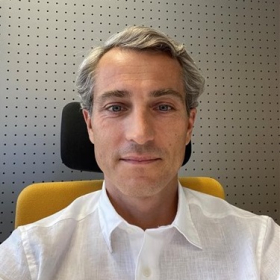

Justas (Boards of Appeal – EUIPO)
“I am from Vilnius (Lithuania) and lived there before moving to Alicante to join the EUIPO. Being the capital, Vilnius is a very vibrant city that offers a rich cultural life and diverse gastronomic experiences. It also has one of the biggest old towns in Eastern Europe.
I joined the EUIPO as a trade mark examiner in 2007. In 2012 I was appointed head of decisions sector within one of the services of the Operations Department. Since 2015 I’m part of the litigation team which is in charge of defending EUIPO’s decisions before the Court of Justice of the European Union.
My regular working day consists of preparing procedural documents for the Court of Justice of the European Union and researching its case-law. In addition, I often travel to Luxembourg to participate in oral hearings.
A career at the EUIPO appealed to me for various reasons. Already when studying law, I had a particular interest in intellectual property. Moreover, I really enjoy working in a multicultural environment and I am a true believer in the purpose of the European Union. Last, but not least, Alicante offers a great quality of life, especially when you have a family with children.”
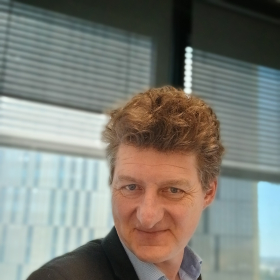
Martin (Lawyer linguist – Court of Justice of the EU)
Na českém překladatelském oddělení se věnuji mimo jiné práci na interních předpisech, tedy na jednacích řádech a různých prováděcích předpisech a pokynech k nim. Průběžně se novelizují a aktualizují a to se pak promítá do celé řady dalších dokumentů soudu, včetně jeho rozhodnutí. Jde o práci, při níž má každé slovo svou váhu. Přesné porozumění textu a jeho smyslu je zcela nezbytným předpokladem. K tomu napomáhá týmová práce a komunikace s ostatními překladatelskými odděleními a autory překládaných textů. Spolupráce, komunikace v různých jazycích a preciznost jsou právě tím, co mě na mé práci tolik baví a uspokojuje.
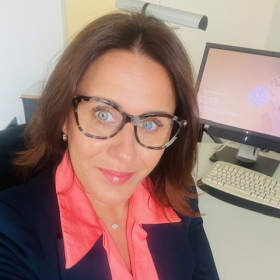
Kateřina (Lawyer linguist – Court of Justice of the EU)
Po absolvování Právnické fakulty v České republice a ročním studijním pobytu na univerzitě ve Spojeném království v rámci programu Erasmus jsem zahájila svou profesní dráhu jako stážistka u Soudního dvora Evropské unie, a to ještě před vstupem České republiky do Evropské unie. Krátce po ukončení stáže jsem nastoupila jako pomocná pracovnice do útvaru, jehož hlavním úkolem byla příprava Soudního dvora EU na rozšíření Evropské unie v roce 2004, kdy se její součástí stala i Česká republika.
Měla jsem tu čest podílet se na vzniku českého oddělení v rámci ředitelství pro právní překlady. Tato práce pro mě představovala významnou profesní výzvu a současně přispěla k položení základů organizační struktury českého překladatelského oddělení v podobě, v jaké existuje dodnes. Po více než dvaceti letech působení ve funkci právníka-lingvisty u Soudního dvora Evropské unie vnímám svou práci v českém oddělení Generálního ředitelství pro mnohojazyčnost stále jako velmi podnětnou, zejména v kontextu současných proměn vyvolaných nástupem umělé inteligence.
Dlouhodobě se zaměřuji na oblast práva duševního vlastnictví, aktivně se podílím na rozsáhlých terminologických projektech, stejně jako na výběru externích spolupracovníků a budoucích kolegů. Výkon funkce právníka-lingvisty u Soudního dvora Evropské unie představuje unikátní spojení právního vzdělání a hluboké znalosti cizích jazyků, které jsou zároveň mou dlouholetou vášní. Součástí mé každodenní pracovní náplně je rovněž úzká spolupráce s dalšími útvary Soudního dvora, s kabinety soudců, s kolegy z ostatních orgánů EU a s externími odborníky. Práce v multikulturním prostředí, které Soudní dvůr Evropské unie poskytuje, je mimořádně obohacující a představuje výjimečnou profesní zkušenost.
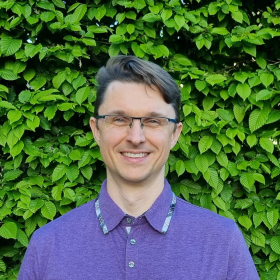
Michal (Lawyer linguist – Court of Justice of the EU)
Jmenuji se Michal a jako právník-lingvista u Soudního dvora Evropské unie propojuji právo, jazyk a technologie v dynamickém prostředí evropské justice. Moje práce není jen o překládání, ale i o skutečném porozumění, které nadále vyžaduje kritické myšlení, jazykovou zručnost a právní erudici. Chytré algoritmy, pokročilé jazykové nástroje a umělá inteligence mi usnadňují část práce a zároveň mi otevírají nové možnosti, jak právní texty analyzovat a interpretovat. Neustále se učím pracovat s moderními technologiemi – od překladatelských softwarů až po pokročilé AI aplikace – a pomáhám kolegům tyto nástroje zvládnout tak, aby jim usnadnily jejich práci místo toho, aby je brzdily. Díky znalosti českého práva pomáhám kolegům z různých právních kultur pochopit jeho specifika a přispívám k vytváření společného právního jazyka pro celý evropský prostor. Je to práce plná výzev a neustálého učení, ale právě proto je tak zajímavá! Pokud tě baví právo a jazyky, zajímáš se o technologie a láká tě práce v evropské justici, možná je to příležitost přesně pro tebe. Chceš taky být u rozhodnutí, která ovlivňují miliony lidí? 🚀
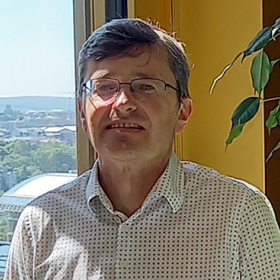
Marek (Lawyer linguist – Court of Justice of the EU)
Jmenuji se Marek a na Soudním dvoře pracuji jako právník lingvista přes 20 let. Právní zkušenost předtím získanou v advokacii mohu využívat i v současné práci, zejména v souvislosti s agendou týkající se duševního vlastnictví. Při používání nejnovějších technologií se v této oblasti podílím zejména na vypracování příslušné právní terminologie a srovnávacích terminologických rešerší. V rámci překladů a revizí právních dokumentů kontroluji mimo jiné správnost a soudržnost používané terminologie.
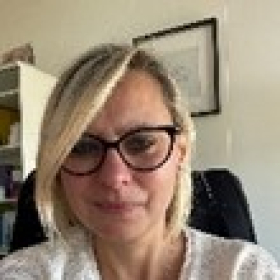
Juliana (Court of Justice of the EU)
“Svoju prácu už viac ako 15 rokov, keď som úspešne absolvovala výberové konanie na miesto právneho lingvistu, vnímam ako poslanie. Jednou z hlavných úloh právnika lingvistu na Súdnom dvore v Luxembursku je zabezpečiť, aby právne dokumenty Súdneho dvora boli presne a v súlade s právnou terminológiou preložené do všetkých úradných jazykov Únie. Právnik lingvista pracuje v multikultúrnom a multijazyčnom prostredí. Samotné Luxembursko poskytuje vysokú kvalitu života, kultúrne a športové vyžitie pre všetky vekové kategórie. Ak ste zanieteným lingvistom so záujmom pre právo a európsku integráciu, táto práca a životný štýl v Luxembursku môžu byť pre vás ideálnou kombináciou.”
***
“After successfully completing the selection process for the position of legal linguist, I have been seeing this job as a mission for more than 15 years. One of the main tasks of a lawyer linguist at the Court of Justice of Luxembourg is to ensure that the legal documents of the Court of Justice are translated accurately and in accordance with legal terminology into all the official languages of the Union. As a lawyer linguist, you have the opportunity to work in a multicultural and multilingual environment. Luxembourg itself provides a high quality of life, cultural and sports activities for all age groups. If you are a passionate linguist with a passion for law and European integration, this job and lifestyle in Luxembourg could be the perfect combination for you.”
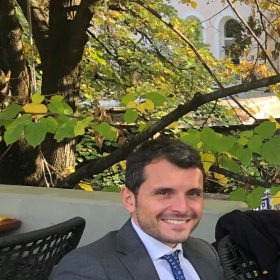
Giovanni (DG HOME)
"My first visit to Brussels was as a university student, when I realised that this would be a great place to work in an international context and contribute to advancing European integration.
After starting my career in the European Commission in the Directorate General for Employment and Social Affairs, I moved to Home Affairs 9 years ago.
I have worked on different files related to migration and security, including a two-year deployment in Italy dealing with the migration crisis. I have dealt with both operational and policy files. There is great diversity of tasks and files you deal with in DG HOME, so it never gets boring.
Working in Home Affairs in the European Commission gives you the opportunity to deal with subjects that are under the spotlight of politics and public opinion, directly related to the welfare and security of our societies.
I have been living in Brussels for 13 years now, it is my second home, a diverse and multicultural city, where it is easy to connect with people."
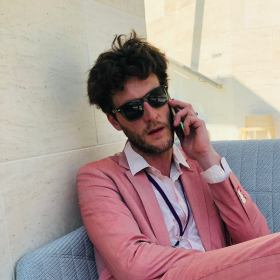
Pieter, Council of the E
“I have been working for the European institutions for more than 10 years and I have not regretted a single day. It was my dream to work for the institutions, since I was 16. I must say, it turned out even better than what I imagined at 16. For me, not a single day has been the same. And every day has been great. The job has offered me a lot of satisfaction. You find challenges to resolve. You get opportunities to learn new skills. All this in a multi-cultural environment. I find it amazing to work with people from all over Europe and in a multi-lingual environment.”
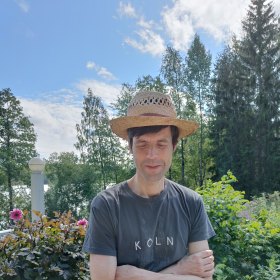
Ville, juriste
"Hi,
I am Ville, legal officer in the Commission’s Directorate-General for Health and Food Safety and blind since my birth.
For me working for the EU Institutions was a dream and succeeding it seemed so unlikely that I almost never tried.
But with the encouragement and support of those closest to me, I did - and now I have been working here since 2013. If I could do it, why couldn't you?
However, there is no prize without effort. Make sure that your professional skills match the job you are applying for and find out as much as possible so that you are prepared for each step.
Think what you can give to the Institutions instead of what they can give to you, be honest about your disability if you have one and any special needs.
Think proactively about how to cope with any issues the disability could cause in your work as smoothly as possible.
Show that you have the competences, knowledge and initiative to be entrusted with the responsibilities of the job. Be motivated and show it. It may sound a lot and it is indeed a bit unfair.
As persons with a disability we need to be even better prepared than others, not to admit it would be dishonest, but it is possible, you can do it!"
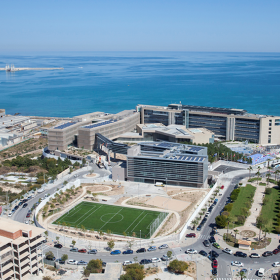
Judit (Operations Department – EUIPO)
" Hi, my name is Judit. I am a lawyer and before joining the EUIPO, I worked in the private sector, in a Trade Mark and Patent Attorney and in a Law Office in Hungary.
When I joined the EUIPO in 2008, I started as a temporary agent in a very competent and supportive team. After joining the Office, I participated in several EPSO and also internal competitions. Finally, I managed to pass an EPSO IP competition and in 2014, I became an official.
From the beginning, I have been working in the Operations Department of the EUIPO. I am responsible for taking decisions in Cancellation and Opposition proceedings against European Union trade marks applications and registrations. I mainly work in German and English, but I also have the chance to deal with Hungarian files. I have defended litigation cases before the General Court in Luxembourg as well, and I have prepared responses for the Court, as well as pleaded at oral hearings.
I enjoy my work because of its diversity, it always offers new learning opportunities. Working in a multicultural environment is a great experience, both culturally and professionally. I have the opportunity to meet interesting and inspiring people from different backgrounds. Mentoring newcomers also fills me with energy, and beyond work, I have the opportunity to get to know colleagues by participating in the different social clubs available.
On top of this, I love sunny Alicante.
So, don’t hesitate to apply! You will have the opportunity to work in a dynamic and multicultural environment, improve and grow, both personally and professionally, explore different areas, not only developing your practical knowledge in the IP field, but also collaborating with colleagues from other teams and departments and working on different projects."

